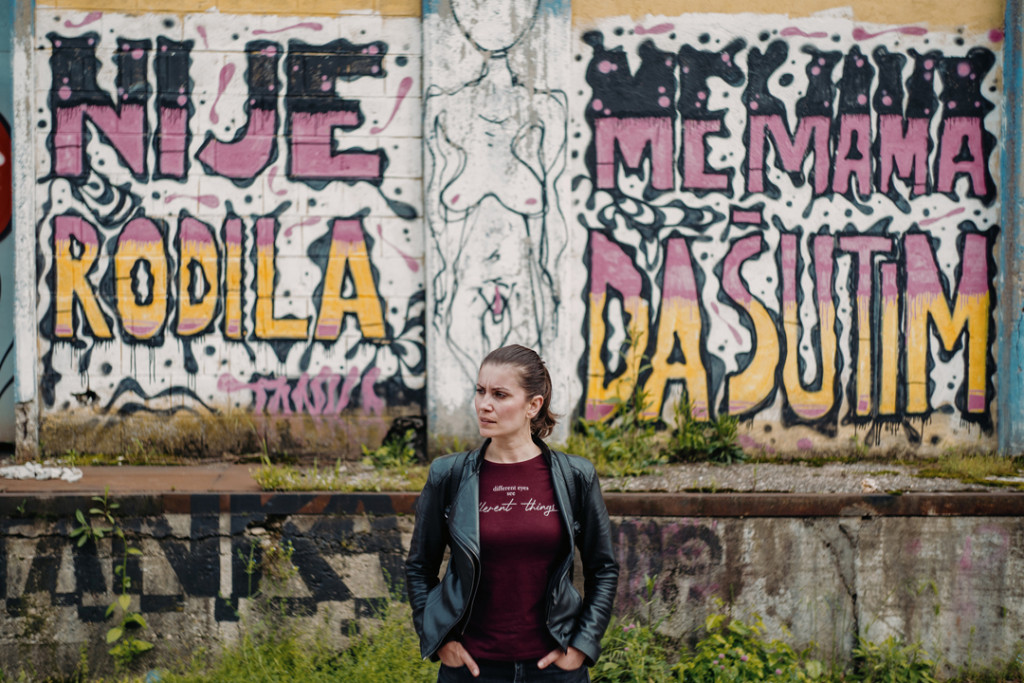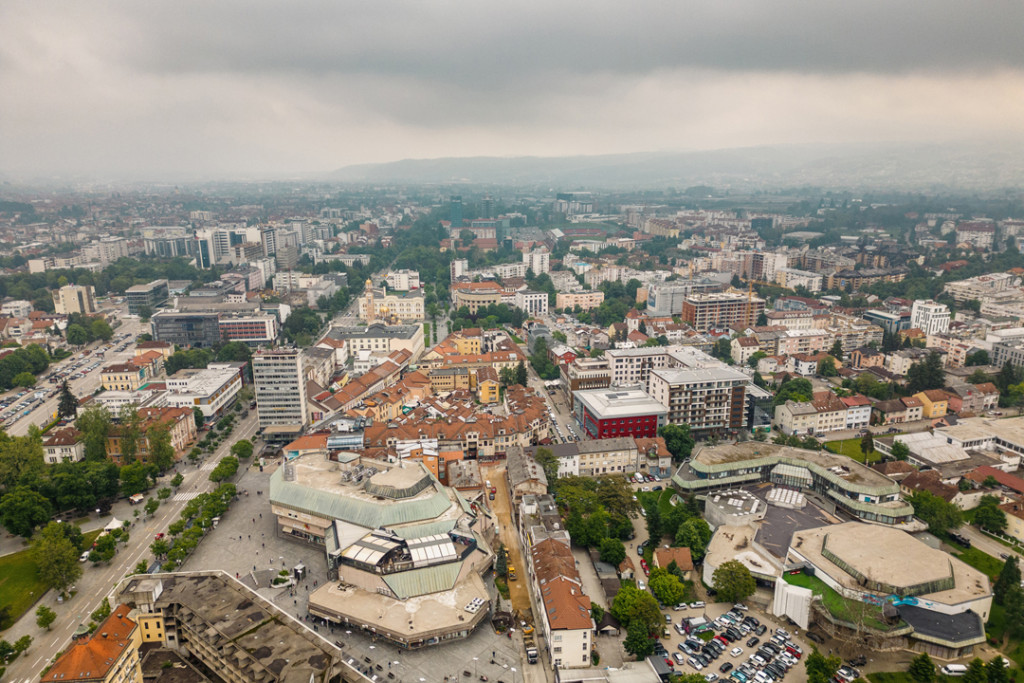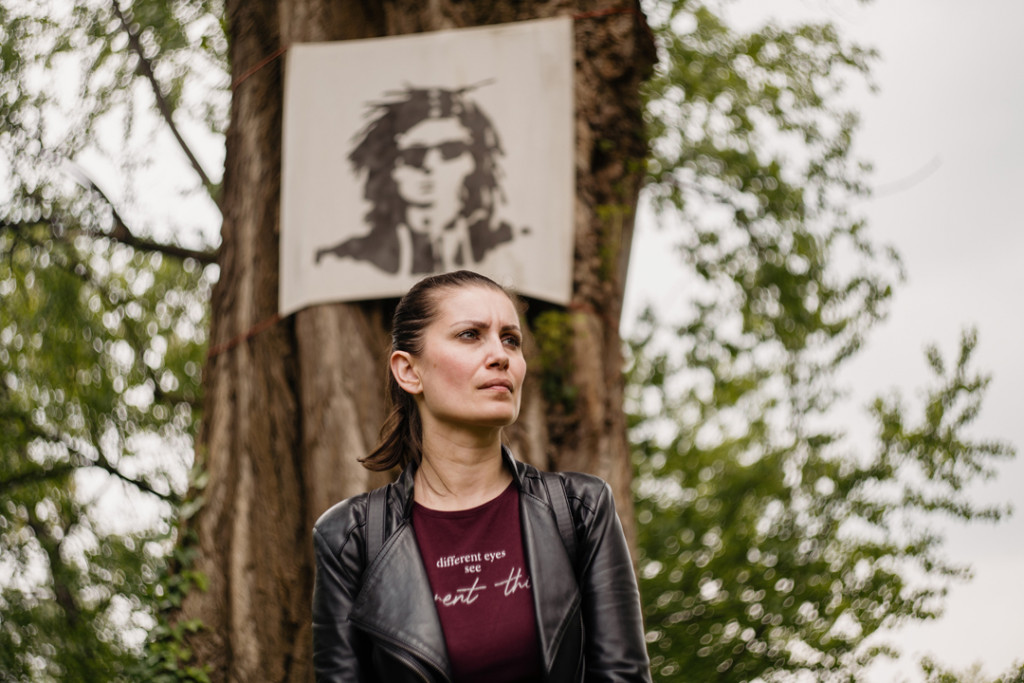
By Osman Zukić / Photos: Almir Kljuno
For journalist Vanja Stokić, journalism is a kind of defence, the defence of the oppressed, the weak, the vulnerable. A constant warning, a caution. In her world, journalists are guardians of the common good, and truth is the basic postulate of journalism.
For activist Vanja Stokić, activism means to make superhuman efforts to do something concrete and useful for the community. For the people you live with. In her world, activists are phenomenal and selfless people who invest their resources and time, some even their private lives, to make the world a better place.
Activists are her friends. She is their ally in this fight.
She says, if we can't help them in their fight, and we should, then at least we shouldn't stand in their way, we shouldn't attack them and we shouldn't accuse them.
She helps socially disadvantaged families. Thanks to her, some got a roof over their heads or got rid of accumulated debts. She helps with fostering abandoned animals. She coordinates various activities when there is nobody else to do it.
To begin with she admits.
"I have always loudly opposed the arbitrariness of the majority."
eTraffic as a utopia
Banjaluka is the administrative centre of the Republika Srpska entity. Today, when you walk in the city streets with someone who grew up there, you will hear that new buildings are springing up in the city, even multi-story buildings, and that there are more cars, and less parks. You pass from the Boska Shopping Centre towards the Tržnica Market and come across the City Mayor who is on stage, in front of dozens of cameras and hundreds of citizens, announcing the largest and most luxurious building in the Republika Srpska entity - the new Hotel Palas. His face is illuminated by spotlights, and his voice is prophetically serious.
There are neighbourhoods in Banjaluka where, when you stop and look around, you are left breathless while standing in front of street art pieces. It is as if all the creative people of this city had gathered in one place and started to make a work of art out of it.
Murals give these buildings a timeless value.
The old names of some places are still alive. For people who have been here all their lives, Mejdan is still Mejdan. You would say: "Language is older than politics and it certainly outlasts it."
Vanja Stokić was born and raised in Brčko. She came to Banjaluka to study journalism 16 years ago. Today, she is the chief editor of eTrafika portal, a small alternative media that reports on human rights, corruption, public procurement, and minorities. The portal is her safe place, a place of freedom, a place of justice. Her utopia.
When you talk to her, you notice that every spoken sentence is preceded by deep thinking. There are no superficial claims, no guesswork.
"It is journalists who often write history, who record some historical moments, and often their footage is used in court proceedings."
We can change the world only if we tell the truth.
"My favourite writer says that telling the truth is a revolutionary act. That is what should be guiding us all. To have the strength and courage to tell the truth."

Migrant situation
Migrants and refugees discovered this country in 2017 as a new route on their way to Western European countries. That year, the border police discovered about six hundred illegal entries in the country. This was three hundred percent more than in 2016.
Since then, we have seen them in the streets and in parks. When we drove on the main road, we came across lines of people walking with heavy steps, going somewhere. The camps were getting fuller and fuller. Cities in the northwest became full of foreigners, and the local authorities did not know how to act in response to this. Many were confused, some were angry. Empathy would come and go. The seasons changed, and the route became more popular. European officials started mentioning wire fences.
Vanja has published dozens of stories about migrants in Bosnia and Herzegovina. Puzzled by the amount of confusing information in the media, she wanted to find out for herself who these people were. She asked where they were going, where they were coming from and why they were on that journey. She went to squats in Bihać, she visited legal and illegal campsites.
On Lipa Hill, 20 kilometres away from Bihać, where the migrant camp is set up, temperatures can go down to -20.
"I have never been so cold, anywhere in my life, like I was there."
She was among a thousand hungry and frostbitten people at the burning ground of the camp.
"When I delve into a topic and begin working on it, I realise that it makes me rebellious. I disagree with how my country treats the people I report on."
She published photos, videos and wrote texts, so that the world would know what was really happening. That somewhere in Bosnian mountains over a thousand people were suffering from hunger, disease and cold.
Before going to the field, she would call her friends and ask them to send something for these people.
She would go to Bihać in a car loaded with medicine, food and clothes. Her colleague would drive and she would spend three hours writing information about the medicine on the boxes. People who needed those boxes didn't know the language.
"It was a lot of work that was exhausting for me, both physically and mentally, but I just couldn't stop."
For journalist Vanja Stokić it is important to understand the people that she writes about. To understand their story. For her, the migrant situation is not a crisis, but a situation that her country should be able to solve, and at the same time to protect the rights of all citizens who are in the situation.
"They are only people in trouble, people who sleep in a forest, who are hungry, who have nothing to wear, who are sick."
On the other hand, in the public, the story was spreading that they were terrorists, criminals, a potential danger. Some of her acquaintances wanted to test their prejudices, so they went with her to the field. When they saw what the situation was really like, both in camps and in squats, they started collecting aid for migrants.
While reporting on migrants, she got to know many of them very well. Today, she receives calls from them from Belgium, Italy, Spain, where they found jobs and a roof over their heads. She remembers them from the time when they were in her country.
"I have this image of them how they suffered here, how they had nothing to eat, how they were beaten by police, how they were exiled by some people in the local community."
Most of them are educated. They listen to the same music as her and share the same view of the world.
The truth about them
When reporting on the migrant situation, it was important to her that the truth about them reaches people. The local population mainly took information from the media on the basis of which they created various stereotypes. She fought against those stereotypes.
"They are saying that there are no women or children among them. There are. True, much less than men. Some children are even born during the journey."
However, it is difficult, she says, to persuade a woman to stand in front of the camera and say something. It is not ethical to film children.
"That's why we think that there are only men here."
They walk in the streets. They look different. They don't speak the language of the place. Their intentions are unknown.
"Nobody wonders when they became grown men. I met young adult men who left their home at the age of ten. They set out on the journey as children and in the meantime have grown up."
They told her that they no longer had the sense of belonging. They don’t remember what it's like to sleep in bed, what it's like to have a family lunch, what it's like to celebrate holidays.
"It was all stolen from them. They are missing a very important part of life."
Journalist and activist Vanja Stokić makes an effort to understand people, to share their story in the society where she lives and to help them when they need it most.

Stories about the LGBT community
Throughout the years of her journalistic work, she also reported on the activities of the LGBT community in Bosnia and Herzegovina. She wrote about their rights, their situation, problems. She had the same motivation - to make the public face the stories of people whose rights are denied.
"I am an ally to these people, their support in whatever way I can be."
She was recently attacked by hooligans in the middle of Banjaluka, together with several other activists, because of this alliance. She and her boyfriend suffered physical injuries.
What actually happened?
In mid-March of this year, the BH Pride March publicly announced an event in Banja Luka. It was a discussion, a film screening and a party. She was supposed to speak about the alliance at the discussion.
However, the public took it differently.
"A spin was released that they were organizing a march in Banja Luka."
Who released the spin?
"The assumption is that someone misread the post. I think it came from the football fans. But, that mistake led to very serious consequences."
The football fans organised themselves very quickly and started a campaign against the LGBT community. They plastered the city with the posters that looked like they were made by activists. They took their logo, their colours and wrote: "We are waiting for you".
Did people in Banjaluka really think that a march would happen?
"Activists knew very well that they were being told that they would wait for them. It was a kind of threat."
In those days, many people were reporting about it and the story was spreading that there would be a pride march in the streets of Banjaluka. This stirred some right-wing non-governmental organisations that in their names have words - peace, love, brotherhood, humanitarian, God...
They sent a letter to Banjaluka City Mayor Draško Stanivuković, Republika Srpska President Milorad Dodik, and Prime Minister Radovan Višković. They asked them to ban the event.
In the end, the police banned it.
However.
"They banned it on the day the event was supposed to take place. Activists were already in Banjaluka, physically they were already there."
Therefore, they decided to organise an informal meeting in private premises in the city.
"A few minutes before my boyfriend and I joined them, the police informed the activists that they were not safe and that they had to leave Banjaluka. The police said that and left. About fifteen people were standing in the street, disoriented, confused. What was going on?"
And then, about thirty people, with masks on their faces, started running towards them. They had bats, bottles, knuckle dusters.
She is theirs
"I tried to hide in a garden, looking for protection in five or six men. However, they stopped me at the very entrance to the garden and said that I did not belong there. They shouted: She is not ours, she is theirs. And then the hooligans arrived."
They pushed her over a concrete wall between two houses.
"My glasses fell off. I couldn't see anything. I was disoriented. I was hurt. My hand started bleeding."
She realised that those neighbours targeted her as an intruder, as someone who was unwanted, as someone who would dirty their garden and that someone should punish her for it. She repeats that targeting and dividing us and them in these parts is dangerous.
"I have always avoided to take sides, to be claimed or to be disowned on any clear grounds."
However, she did it, when she had to.
"If we are the neighbours who do not want to protect the girl who is attacked by hooligans, and who obviously support the attack on LGBT activists, and if they are a group of activists who just want to fight for their rights, for a better position in the society, who want to do something concrete for this community, then I will gladly be theirs forever and I will never be ours."
After the attack, she left Banjaluka on the same evening, together with other activists.
"The police actually told us that they could not protect us, that they could not guarantee our safety."
The Defamation Law
Journalist and activist Vanja Stokić returned to Banjaluka a few weeks later. To do her job. During our visit in the newsroom, she was preparing for a public debate on the draft law on the criminalisation of defamation in the Republika Srpska entity.
In the meantime, the two-month public debate has ended. If the National Assembly of the Republika Srpska entity adopts the bill on the amendments, and the Council of Peoples votes for them, the president of the entity will finally declare this law as valid.
The draft law, which prescribes fines for defamation, from around EUR 2 500 to even EUR 60 000, was voted for by 49 members, 21 were against, and no one abstained. Higher fines are prescribed for situations when defamation occurs in the media, including social networks or in a public meeting.
According to a survey conducted recently by the BH Journalists’ Association, over 74 percent of the respondents in this entity believe that in some cases attacks on journalists are justified.
"I think that the announced criminalisation of defamation is a personal revenge of politicians against all those who dared to look into their irregular affairs and the affairs of their families. Primarily, it's against journalists and activists. They will come for us first. We are their first target. However, they will not stop there. After they try to restrain us, after they even eliminate some of us, they will come for other citizens. Those that are not to their liking."
However, she warns, there will no longer be journalists to report about it.
"Not because they will not want to, but they really won't be there physically, they will be prevented from releasing the news to their fellow citizens about what is happening. Judging by everything that is happening, the battle is already lost and the law will be adopted."
The number of political pressures and verbal threats against journalists has increased by 40 percent compared to 2021. In 2022, a total of 31 cases of attacks, threats and pressures on journalists and the media in Bosnia and Herzegovina were registered in the database of attacks on journalists, on the website safejournalists.net. In 22 cases, death threats were sent to journalists, verbal and other forms of threats and political pressure on media workers and the media.
The BH Journalists’ Association reports that the Helpline for Journalists recorded 79 cases of violations of rights of journalists and media freedom in 2022, and according to the reports of Reporters Without Borders, Bosnia and Herzegovina is ranked at 64th place on the 2023 World Press Freedom Index.
For example, Croatia is ranked at 42nd, Serbia at 91st, and Montenegro at 39th.
"We are moving towards one-mindedness, towards totalitarianism, towards the rule of one man who will dictate exactly what we will write, how we will think, what we will say."
Register of non-governmental organisations
In addition to the criminalisation of defamation, another law is being prepared in the Republika Srpska entity. Namely, at the session held in late March, the Government prepared the draft law on a special register and transparency of non-profit organisations.
The announced law implies the obligation for non-governmental organisations whose projects are financed from abroad to report all transactions and all activities.
"If Milorad Dodik, two or three times, says that someone is a secret agent, a foreign agent, a traitor of his country, then the public will see it that way. It's politicians' revenge against us who have been protesting against various anomalies in the society for years, who have initiated protests, who have filed lawsuits against institutions, who have prevented friends of our politicians from building mini-hydropower plants across the country and the like."
Dozens of times, Vanja Stokić reported to the police cases of threats on social networks or on the streets. Only one case was forwarded to the prosecution. Otherwise, the police treat these reports as "an expression of personal opinion and dissatisfaction" even when someone threatens to cut her head off.
And when the threat from the online world becomes a concrete attack in the street, then you have to leave your city.
"Even after the adoption of these laws, I will continue to do my job as I have been doing it until now. We'll see what the consequences will be. I don't see any other way. If I agree to withdraw, it's not me."
There is a lot of division of responsibility in our society, she says in the end. People from a certain group think that they do not need to do something because a certain problem does not concern them. They count on someone else to take the initiative.
"Don't wait! Maybe no one else will show up, and while waiting you're just wasting time."
(A story from the author's series "Activism in BiH: Lessons Learned and Missed", created with the support of the European Endowment for Democracy.)
